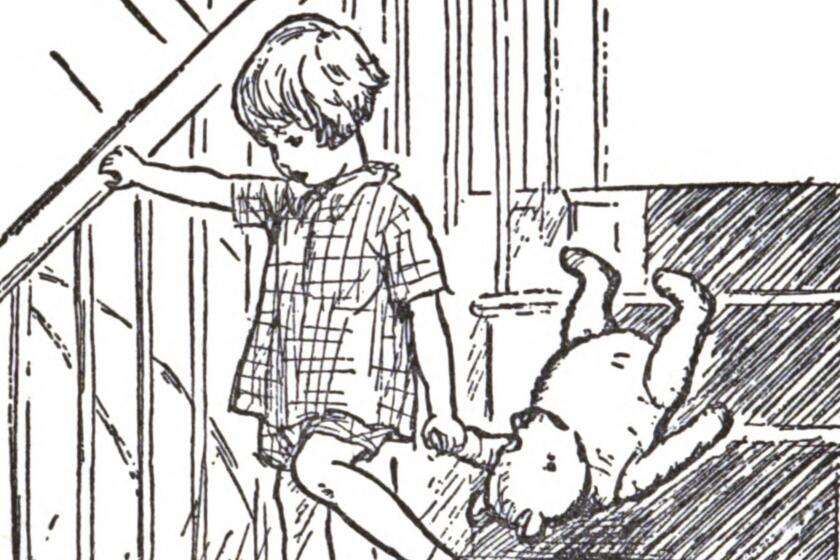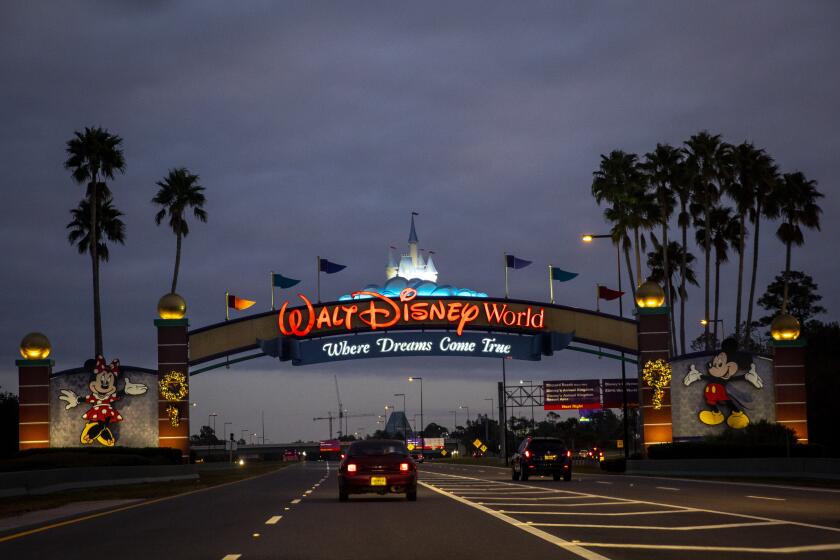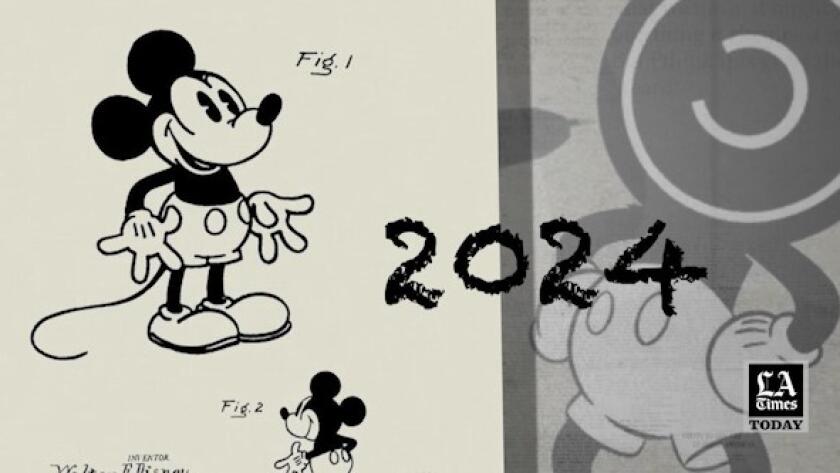Republicans took away Disney’s special status in Florida. Now they’re gunning for Mickey himself
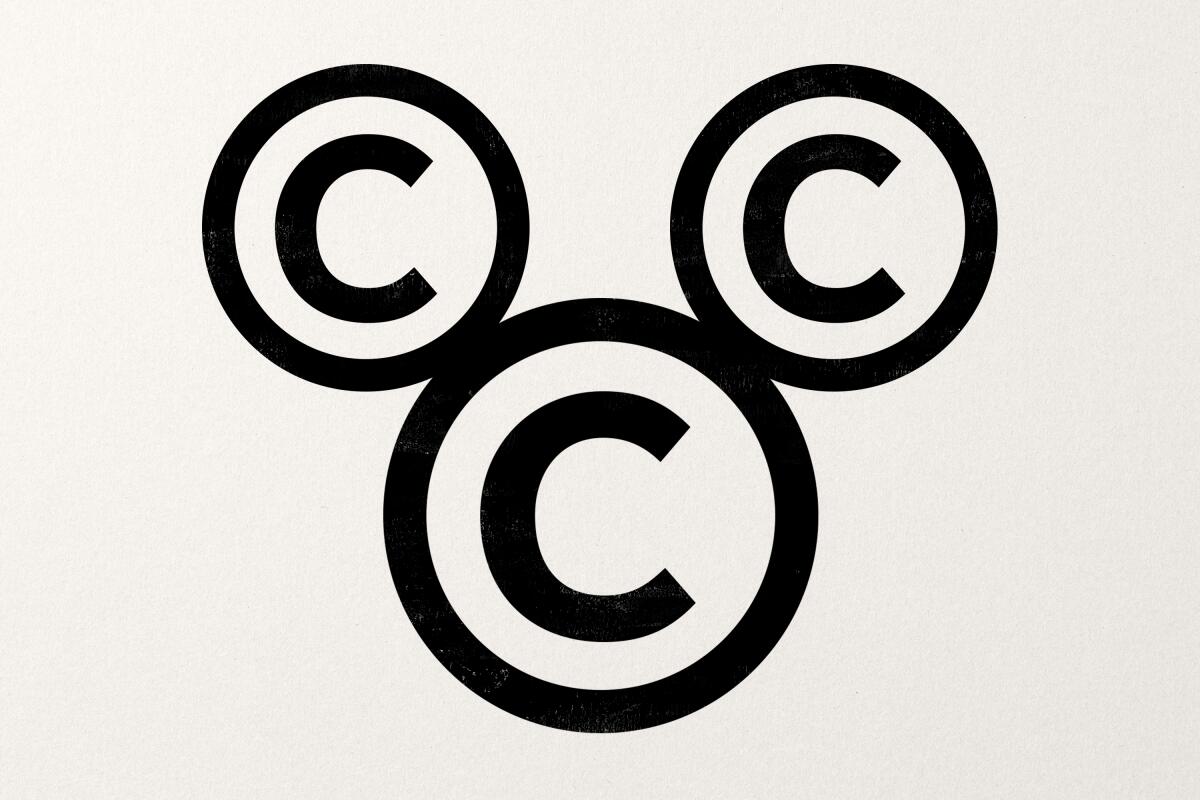
- Share via
It all began with a mouse, and now that big-eared rodent is in the middle of a turf war between conservatives and one of the world’s most influential media companies.
Mickey Mouse has been the symbol for Walt Disney Co. since debuting 94 years ago in a black-and-white short film that launched the company into an animation powerhouse.
For the record:
12:12 p.m. May 12, 2022An earlier version of this article incorrectly referred to Disney’s trademark protection on Mickey Mouse as a trademark patent. Disney holds trademark rights to the Mickey Mouse character, not patents.
But in 2024, the copyright protection for Mickey Mouse will expire, putting the original, old-timey version of the mouse from the “Steamboat Willie” animation in the public domain, freeing it for artists, creators and everyday fans to use in their own creative work.
A group of Republican lawmakers has vowed to oppose any effort to extend the protection — already extended twice since the original expiration date in 1984 — as a way to punish Disney, which some conservatives have cast as an outsize cultural force with a progressive agenda they have recently taken to describing as dangerous.
On Tuesday, Sen. Josh Hawley (R-Mo.) went a step further, saying he plans to introduce legislation to strip Disney of the copyright protections this year. “No more handouts for woke corporations,” Hawley, also a constitutional lawyer, wrote on Twitter.
Disney representatives have declined to comment on the subject.
The tussle puts a spotlight on the significance of Mickey Mouse — financial and sentimental — amid Disney’s growing slate of intellectual properties, which includes enduring characters from the “Star Wars,” Marvel and Pixar franchises. Today’s Disney watcher might ask: Who still cares about Mickey Mouse? Has the character that launched a global media brand been upstaged by Yoda, R2-D2, Elsa, Stitch, Buzz Lightyear and Iron Man?
“Is the Mickey Mouse brand as significant today as it was 50 years ago? No,” said Daniel Binns, a branding expert and chief executive for North America at the brand consulting firm Interbrand. “It is still one of the most recognizable symbols in the world.”
Writers and artists who created novelizations of some of Disney’s most important franchises say the entertainment giant has stiffed them of royalties.
Merchandise licensing and retail sales generated $5.2 billion for Disney last year, but the company does not break out how much of that comes solely from the sales of Mickey Mouse products. Wall Street analysts who cover Disney say there is not enough public information available to estimate that number.
Even before the Republican campaign against Disney, the entertainment giant had been preparing itself for the expiration of its copyright, copyright experts say. That means Disney, often called “the House of Mouse,” has had decades to insulate itself against a moment when its most iconic character might enter the public domain.
The story of how Walt Disney created Mickey while riding on a train — at first naming him Mortimer until Disney’s wife rejected the moniker — is a tale known to most hardcore Disney fans, said David Koenig, who has written several books about the company.
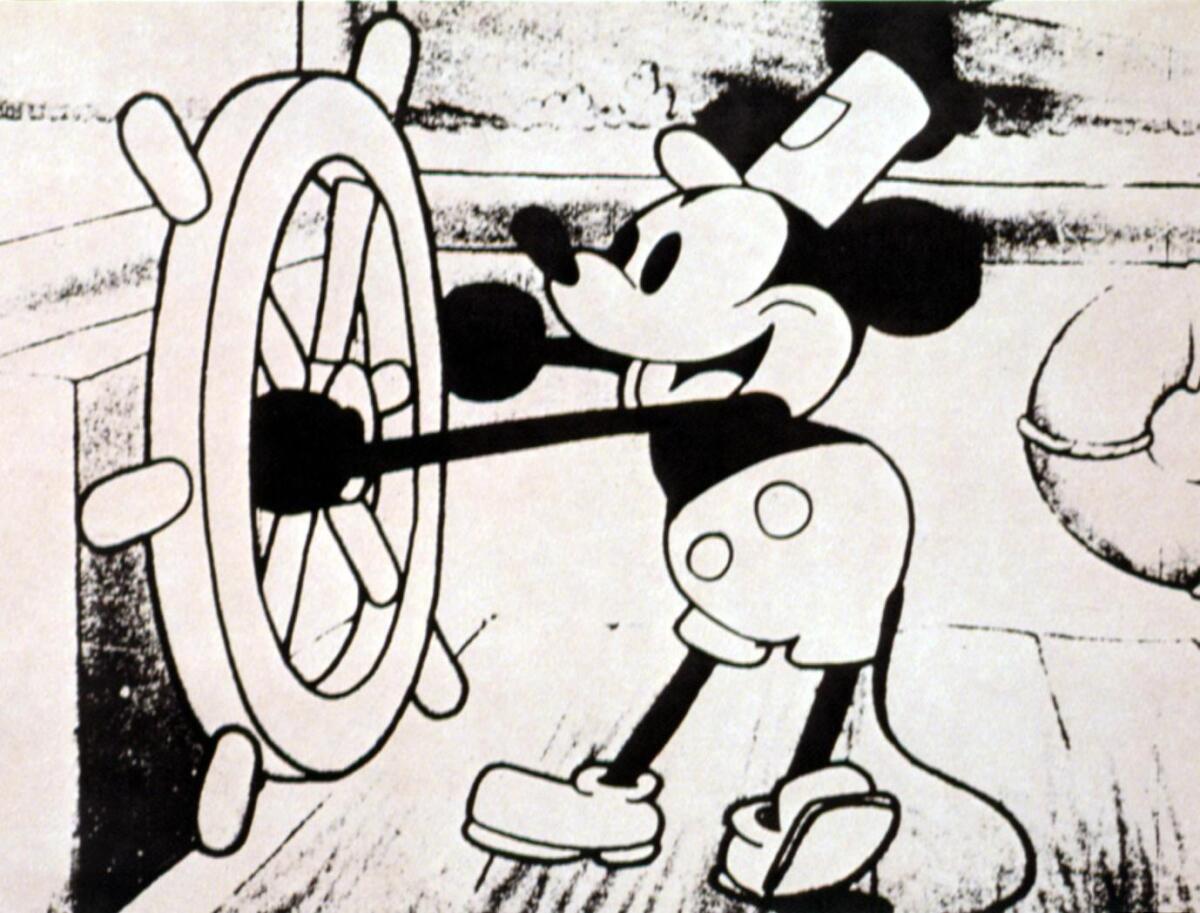
That can’t be said for all of the other characters he created later.
Mickey’s head, represented by the three round circles, is recognized around the world as a symbol of Disney parks and movies.
The mouse’s appeal extended beyond young children. Johnny Ramone, guitarist for the punk rock group the Ramones, wore a Mickey Mouse shirt on stage, as did rocker Axl Rose, in the 1970s and ’80s. The Mickey Mouse watch, first made in 1933, was worn by John Lennon, Andy Warhol, Grace Kelly and astronauts on Apollo 7 and Apollo 10.
“It remains the iconic link to Walt Disney and is the glue that tied everything together,” Koenig said of the mouse.
Among parkgoers who visited Disneyland on a recent weekday afternoon, adults who grew up on Disney before it branched off into superhero action flicks and galactic battle dramas expressed the greatest devotion to Mickey Mouse. Younger visitors, not so much.
“He’s an icon,” said Ryan Nickerson, 41, who was strolling out of the park with his girlfriend Kristina Hallila, 36, both annual passholders from San Francisco. Outdoor speakers near the entrance blasted “When You Wish Upon a Star.”
Nickerson wore a multicolored short-sleeve shirt emblazoned with dozens of Mickey Mouse faces. His true devotion to the mouse was hidden just underneath: He unfastened the shirt’s top button to reveal a tattoo on his chest of Mickey Mouse flying a biplane.
“Nostalgia is what Mickey represents,” Nickerson said.
Several yards away, under the shade of the monorail track, 8-year-old Ethan Buchan of Hayward donned Mickey Mouse ears, with an R2-D2 design, as he played with Legos on the cement. His mother, Rachel, grew up watching Mickey Mouse cartoons but her son prefers episodes of “The Mandalorian,” a “Star Wars” spinoff.
Which character does the boy like the best? “They are all equal to me,” he said with a shrug.
‘Winnie-the-Pooh,’ ‘The Sun Also Rises’ and many other works entered the public domain on Saturday. They show what’s wrong with the system.
The original Mickey Mouse copyright was set to expire in 1984 but has been extended twice by Congress at the behest of Disney and other media companies. The most recent extension came through the Copyright Term Extension Act in 1998, known to many as the Mickey Mouse Protection Act because of Disney’s heavy lobbying in support of the bill.
From 1987 to 1990 — around the time the legislation was being voted on — the Disney Political Action Committee donated $146,519 to federal candidates, while Disney employees gave $474,083 to candidates, plus an additional $133,382 to political parties and other PACs, according to a 1991 analysis by The Times.
The act was appealed to the U.S. Supreme Court by publishers, libertarians and others who called the bill “corporate welfare” that allowed the copyright owners to continue to profit from their work while keeping it out of the hands of the public. The Supreme Court upheld the law.
No legislation has been proposed to extend the copyright a third time, and copyright experts and lawmakers say it’s not likely that any legislators will want to lead that battle, given the opposition and fury it generated in the 1990s. Other companies’ copyrighted characters would also expire, sending more notable characters into the public domain.
Disney critics say the company continues to have influence over copyright law, pointing to the recent naming of Suzanne Wilson as the general counsel and associate register of copyrights for the United States Copyright Office. She formerly oversaw intellectual property and interactive and media legal functions for Walt Disney Co.
Legal experts say the debate over copyright protection is moot because the only version of Mickey Mouse that is expiring is the 1928 black-and-white one depicted in “Steamboat Willie.” Copyright protections remain in place for later versions of Mickey Mouse, the more commercially recognized one that wears white gloves, has bigger ears, distinctive eyes and a pet dog named Pluto, according to experts.
Crucially, Disney also still holds trademark protection on Mickey Mouse, which does not expire. While a copyright keeps other companies from replicating the Mickey Mouse image, a trademark ensures that other companies can’t use the Mickey Mouse image in a way that might suggest their products are made by Disney.
For example, if the copyright expires, a YouTube creator would be able to use the 1928 Mickey Mouse in their own animated video montage, without repercussions. But the trademark protection would not allow anyone to sell merchandise with that, or any, version of the mouse in a way that might suggest the merchandise is a Disney product.

The most common penalty for trademark infringement is an injunction or a cease-and-desist letter directing the user to stop using the trademarked material. But courts can also impose hefty financial penalties on violators.
The trademark protection is enough to ensure that most businesses will think twice before using Mickey’s image to sell products, legal experts say.
“If you put any Mickey Mouse image on a bathroom towel or plush dolls, even if the copyright expires, if people think that that product comes from Disney, then you get into trademark problems,” said Robert Merges, a UC Berkeley law professor.
It’s possible that Disney is protecting Mickey in another subtle way: The company began several years ago to insert snippets of the “Steamboat Willie” cartoon at the opening for many modern Disney animations, including “Tangled,” “Frozen” and “Moana.”
It’s a move that may establish the 1928 version of Mickey as a modern Disney logo or trademark, which would remain protected even if the copyright expires, said Victoria Schwartz, who teaches intellectual property law, copyright law and entertainment law at Pepperdine University.
“They have clearly been preparing for this possibility for many years,” she said.
Florida’s Senate on Wednesday voted to dissolve the Reedy Creek Improvement District, which allows Disney to function as its own government.
Republicans’ focus on the copyright is part of a larger fight the Republican Party has taken up against Disney, sparked earlier this spring over Florida’s Parental Rights in Education law, legislation more commonly known by critics as the “Don’t Say Gay” law.
Since then, conservatives have portrayed Disney — a company not long ago beloved by the Republican Party — as an amoral cultural force using its corporate power and cultural influence to spread ideologies they do not support.
After initially staying silent on the Florida bill, Disney Chief Executive Bob Chapek spoke out against the legislation, drawing the ire of Florida Gov. Ron DeSantis and other GOP leaders, who have condemned what they call Disney’s “woke ideology.” (DeSantis’ political action committee accepted more than $100,000 in campaign contributions from Disney in 2019 and 2021.)
DeSantis, a likely contender for the GOP’s presidential nomination, responded by pushing the state Legislature to repeal a law that allowed Disney to operate as a private government over its Florida properties.
Other Republican lawmakers have jumped on the anti-Disney bandwagon with a threat to let the Mickey Mouse copyright expire.
In an April 7 letter, 17 GOP members of Congress wrote to Chapek, saying they will not support any legislation to extend the expiring Mickey Mouse copyright because of Disney’s “political and sexual agenda,” its opposition to the Florida bill and Disney’s work with China, which included filming parts of the movie “Mulan” in Xinjiang province.
“Mulan’s” star sided with Hong Kong police over pro-democracy protesters last year. This week, it was revealed that Disney shot in a province known for persecution of Uighurs.
“Given Disney’s continued work with a Communist Chinese regime that does not respect human rights or U.S. intellectual property and given your desire to influence young children with sexual material inappropriate for their age, I will not support further extension applicable to your copyright,” wrote the letter’s author, U.S. Rep. Jim Banks (R-Ind.).
The letter accuses Disney of trying to influence children by adding LGBTQIA characters in film and television shows.
U.S. Rep. Lou Correa (D-Santa Ana), whose Orange County district includes Disneyland, said he disagrees with the efforts by Banks and others to “connect civil rights issues with business issues” and vowed to back any legislation to protect the Mickey Mouse copyright if it comes before the House of Representatives.
He said protecting the Mickey Mouse copyright ensures that Disney can continue to capitalize on the character in the U.S. “What is most important to me is protecting those jobs in the U.S.,” he said.
Current conflict is the latest to reveal underlying tensions that have existed between Disney and religious conservatives for decades as it has embraced the LGBTQ community.
- Share via
Watch L.A. Times Today at 7 p.m. on Spectrum News 1 on Channel 1 or live stream on the Spectrum News App. Palos Verdes Peninsula and Orange County viewers can watch on Cox Systems on channel 99.
More to Read
Inside the business of entertainment
The Wide Shot brings you news, analysis and insights on everything from streaming wars to production — and what it all means for the future.
You may occasionally receive promotional content from the Los Angeles Times.

